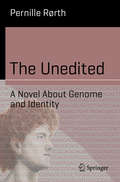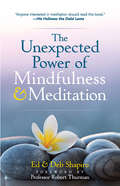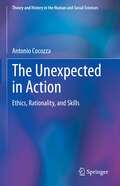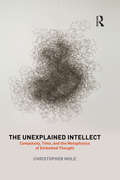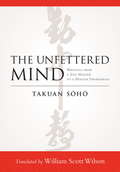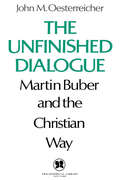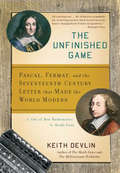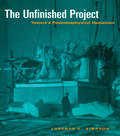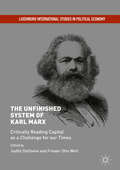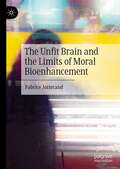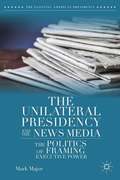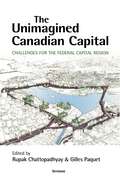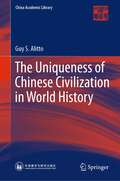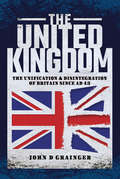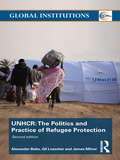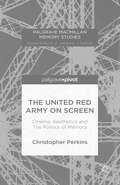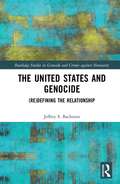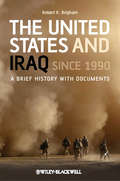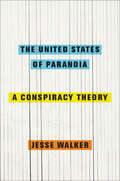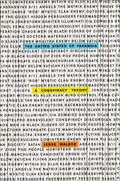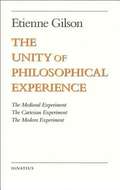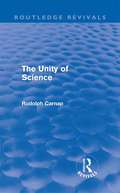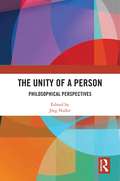- Table View
- List View
The Unedited: A Novel About Genome and Identity (Science and Fiction)
by Pernille RørthThis novel is set in the near future, where human genome editing has become routine. First adopted to fight a lethal virus, it is now widely used to prevent diseases and favor other traits. Ben, Eiko, Celia, Raphael and Leo have just had their coming-of-age genome reading and are struggling with this new information for each their own reasons. Soon, they are cast into the middle of a crisis that threatens the future of their society and pits it against a parallel, but strictly separated, society where genome manipulation is forbidden on religious grounds. The book includes an essay on the potential of human genome engineering and related genome-based choices.
The Unexpected Power of Mindfulness and Meditation
by Deb Shapiro Ed Shapiro"Ed and Deb bring compassion and heart to a modern world where it is sorely missed." — Ram Dass author of Be Here NowBehind the dramas and conflicts of life, there exists a quiet inner place where mindfulness and meditation can help us reside. The sanity and brilliance of this combination can awaken inner strength, foster kindness and fearlessness, and invite radical change. Discover how to transform your life from the inside out with the profound benefits of a calm and stress-free mind.The Unexpected Power of Mindfulness and Meditation features personal insights from visionary leaders — Matthew Fox, Jon Kabat-Zinn, and Marianne Williamson among them — who discuss their methods of maintaining mental health and happiness.“Treat this book as you would a cookery book. You wouldn't just read recipes; you'd try them out. Like cookery, meditation only makes sense if you experience it.” — His Holiness the Dalai Lama, Nobel Peace Prize laureate"Ed and Deb remind us all just how important it is to look after the health and happiness of the mind. With warmth and humor, they show us how to integrate the timeless qualities of awareness and compassion into everyday life." — Andy Puddicombe, founder of HEADSPACE“Mindfulness is the awareness that arises when we pay attention to the present moment. It accesses us to core aspects of our mind that our very sanity depends on, as does our capacity to live wholeheartedly in this crazy world.” — Jon Kabat-Zinn, mindfulness teacher“I can be as nuts as the next person, living in a world like we live in with the craziness and chaos. It takes work to retain our sanity in the midst of all that, and to me meditation is the most powerful tool for doing so.” — Marianne Williamson, New York Times bestselling author of A Return to Love“Ed and Deb Shapiro are two warm, caring, and capable individuals. Their work makes our planet a safer and more loving place to live.” — Bernie Siegel, M.D., bestselling author of Love, Medicine and Miracles“If there is one book you read about meditation, this should be the one. Hear about some of the cool people who do it, why you should do it, and how.” — Sharon Gannon, Jivamukti Yoga“What an accomplishment! Ed and Deb's profoundly unique book offers a one-stop shop for those engaged in mindfulness and meditation. The direct transmission contained in this book can take us one step further. We find it especially useful to help stabilize spiritual activism in these challenging times and we'll refer it widely.” — John Steiner and Margo King, transpartisan activists“I hope that your work is reaching many. It deserves it and so do they.” — Stephen Levine, international bestselling author “Acceptance of what is, that is meditation. This book will help you make friends with your mind. Ed and Deb are spreading love in the world; be a part of it!” — Parmita Pushman, White Swan Records“The pausing has been profound. It has invited me to arrive in the here and now with my child clients, and to accept whatever happens without judging.” — Megan Cronin Larson, play therapist“The wonderful Shapiros are a conduit of joy and spiritual energy that heals hearts on their subtle level.” — Dr. Lex Hixon, author of Coming Home“Ed and Deb make a connection to their friends' spirit. They then bring their spiritual energy all over the world for world peace.” — Kitaro, Golden Globe Award– and Grammy Award–winning musician
The Unexpected in Action: Ethics, Rationality, and Skills (Theory and History in the Human and Social Sciences)
by Antonio CocozzaThe book is a true knowledge-enhancing project, dealing with the forms of rationality at work in social life, which are so many, varied and complex. Published already in Spanish and Italian, it analyses the role played by rationality through the lens of social theories in order to propose a problematic interpretation of human action. Since there is nothing more practical than a good theory when seeking to understand our society, the book reflects on the theoretical approaches that provide useful categories by means of which to understand and interpret individual, organizational, and institutional action. It proposes an analysis of a wide variety of classics by eminent European and Anglo-American thinkers, such as Dahrendorf, Mannheim, Marx, Popper, Weber, Habermas, Luhmann, Machiavelli, Pareto, Ardigò, Cesareo, Parsons, Schütz, Alexander, Bauman, Beck, Sennett, Antiseri, Boudon, Sen, Simon, to shed light on the relationship between rationality, difficulties in thinking and extra-rationality. Finally, the reasons for unexpected action are investigated as well as the strategic role played by ethics, rationality and skills in postmodern societies on the basis of the contributions of Nussbaum and Piketty.
The Unexplained Intellect: Complexity, Time, and the Metaphysics of Embodied Thought
by Christopher MoleThe relationship between intelligent systems and their environment is at the forefront of research in cognitive science. The Unexplained Intellect: Complexity, Time, and the Metaphysics of Embodied Thought shows how computational complexity theory and analytic metaphysics can together illuminate long-standing questions about the importance of that relationship. It argues that the most basic facts about a mind cannot just be facts about mental states, but must include facts about the dynamic, interactive mental occurrences that take place when a creature encounters its environment. In a discussion that is organised into four clear parts, Christopher Mole begins by examining the mathematics of computational complexity, arguing that the results from complexity theory create a puzzle about how human intelligence could possibly be explained. Mole then uses the tools of analytic metaphysics to draw a distinction between mental states and dynamic mental entities, and shows that, in order to answer the complexity-theoretic puzzle, dynamic entities must be understood to be among the most basic of mental phenomena. The picture of the mind that emerges has important implications for our understanding of intelligence, of action, and of the mind’s relationship to the passage of time. The Unexplained Intellect is the first book to bring insights from the mathematics of computational complexity to bear in an enquiry into the metaphysics of the mind. It will be essential reading for scholars and researchers in the philosophy of mind and psychology, for cognitive scientists, and for those interested in the philosophical importance of complexity.
The Unfettered Mind: Writings from a Zen Master to a Master Swordsman
by William Scott Wilson Takuan SohoThis classic samurai-era text fused Japanese swordsmanship with Zen and influenced the direction that the art has taken ever since. Written by the seventeenth-century Zen master Takuan Soho (1573-1645), The Unfettered Mind is a book of advice on swordsmanship and the cultivation of right mind and intention. It was written as a guide for the samurai Yagyu Munenori, who was a great swordsman and rival to the legendary Miyamoto Musashi. Takuan was a giant in the history of Zen; he was also a gardener, calligrapher, poet, author, adviser to samurai and shoguns, and a pivotal figure in Zen painting. He was known for his brilliance and acerbic wit. In these succinct and pointed essays, Takuan is concerned primarily with understanding and refining the mind--both generally and when faced with conflict. The Unfettered Mind was a major influence on the classic manifestos on swordsmanship that came after it, including Miyamoto Musashi's Book of Five Rings and Yagyu Munenori's Life-Giving Sword.
The Unfinished Dialogue
by John M. OesterreicherIn The Unfinished Dialogue: Martin Buber and the Christian Way, author John M. Oesterreicher analyzes Buber's philosophies and writings in this concise book. Oesterreicher's analyses are the perfect companion to understanding Buber in his own words. Martin Buber was an influential Jewish philosopher, essayist, translator, and editor most known for his German translation of the Bible, his religious existentialism philosophy, and his role in the Zionist movement. Scholars and philosophers continue to consult his unparalleled approach to religious studies, and his writings have made a lasting impact on the approach to philosophical thought. New and returning readers of Buber will find clarity and wisdom in his words, along with clarity provided by Oesterreicher's analysis. John M. Oesterreicher wrote and contributed to many texts on the study of religion, including The Unfinished Dialogue, Standing Before God, Jerusalem, and The New Encounter Between Christians and Jews. He also served as the director of the Institute of Judaeo-Christian Studies at Seton Hall University.
The Unfinished Game: Pascal, Fermat, and the Seventeenth-Century Letter that Made the World Modern
by Keith DevlinIn the early seventeenth century, the outcome of something as simple as a dice roll was consigned to the realm of unknowable chance. Mathematicians largely agreed that it was impossible to predict the probability of an occurrence. Then, in 1654, Blaise Pascal wrote to Pierre de Fermat explaining that he had discovered how to calculate risk. The two collaborated to develop what is now known as probability theory?a concept that allows us to think rationally about decisions and events. In "The Unfinished Game," Keith Devlin masterfully chronicles Pascal and FermatOCOs mathematical breakthrough, connecting a centuries-old discovery with its remarkable impact on the modern world.
The Unfinished Project: Toward a Postmetaphysical Humanism
by Lorenzo C. SimpsonAs humanity becomes increasingly interconnected through globalization, the question of whether community is possible within culturally diverse societies has returned as a principal concern for contemporary thought. Lorenzo Simpson charges that the current discussion is stuck at an impasse-between postmodernism's fragmented notions of cultural difference and humanism's homogeneous versions of community. Simpson proposes an alternative-one that bridges cultural differences without erasing them. He argues that we must establish common aesthetic and ethical standards incorporating sensitivity to difference if we are to achieve cross-cultural understanding.
The Unfinished System of Karl Marx: Critically Reading Capital As A Challenge For Our Times (Luxemburg International Studies In Political Economy Ser.)
by Judith Dellheim Frieder Otto WolfThis book examines what we can gain from a critical reading of Marx's final manuscript and his conclusion of the "systematic presentation" of his critique, which was the basis for Engels's construction of the third volume of his infamous 'Capital'. The text introduces the reader to a key problem´of Marx's largely implicit epistemology, by exploring the systematic character of his exposition and the difference of this kind of 'systematicity' from Hegelian philosophical system construction. The volume contributes to establishing a new understanding of the critique of political economy, as it has been articulated in various debates since the 1960s - especially in France, Germany, and Italy - and as it had already been initiated by Marx and some of his followers, with Rosa Luxemburg in a key role. All the chapters are transdisciplinary in nature, and explore the modern day relevance of Marx's and Luxemburg's theoretical analysis of the dominance of the capitalist mode of production.
The Unfit Brain and the Limits of Moral Bioenhancement
by Fabrice JotterandIn light of the potential novel applications of neurotechnologies in psychiatry and the current debate on moral bioenhancement, this book outlines the reasons why more conceptual work is needed to inform the scientific and medical community, and society at large, about the implications of moral bioenhancement before a possible, highly hypothetical at this point, broad acceptance, and potential implementation in areas such as psychiatry (e.g., treatment of psychopathy), or as a measure to prevent crime in society. The author does not negate the possibility of altering or manipulating moral behavior through technological means. Rather he argues that the scope of interventions is limited because the various options available to “enhance morality” improve, or simply manipulate, some elements of moral behavior and not the moral agent per se in the various elements constitutive of moral agency. The concept of Identity Integrity is suggested as a potential framework for a responsible use of neurotechnologies in psychiatry to avoid human beings becoming orderers and orderables of technological manipulations.
The Unilateral Presidency and the News Media
by Mark MajorMedia coverage of presidential actions can not only serve journalistic purposes, but can also act as a check against unilateral decision making. The book seeks to uncover how the news media has worked to curtail overreaching power within the executive branch, demonstrating how the fourth estate keeps presidential overreach at bay.
The Unimagined Canadian Capital: Challenges for the Federal Capital Region
by Caroline Andrew Anne Gilbert Andrew Sancton André Juneau David L. Gordon Éric Champagne Guy Chiasson Meyer Burstein Almos TassonyiToo many stakeholders have neglected their duty of imagining an aspiring federal capital region for Canada. Under the auspices of the Forum of Federations, a number of persons interested in the fate of Canada’s federal capital region came together to examine the challenges facing the region and to put forward suggestions to deal with them.In this report on the brainstorming exercise conducted in January 2011, professionals, academics, and elected officials take stock of the vast array of assets on which the federal capital region can build; probe the many sources of failures in coping as effectively and creatively as one would expect with the diversity, trans-border, financial, and governance challenges; and make suggestions to ensure that the federal capital region does not remain “unimagined” in the future.
The Uniqueness of Chinese Civilization in World History (China Academic Library)
by Guy S. AlittoThe book is a meticulous work in answering these questions which often occur to foreigners as well as modern Chinese themselves at the thought of the old China and its experience in modern times: What is Chinese civilization? How could it exist for several millennia and spread that far? Is there anything inherent in this civilization?From the standpoint of an “outsider” to this civilization, the author incorporates various elements, such as geographic factors, language, thoughts, with the recurrent themes along the two thousand years and changes throughout, rather than simply following a lineal progression. His historiographical approach, the methodology of eclectic common sense, as he termed it, is a new try in this field and will present a brand new perspective for both readers and researchers in that field.
The United Kingdom: The Unification & Disintegration of Britain Since AD 43
by John D. Grainger&“A salient, measured, and illuminating study of history with reflections on what Britain&’s past means for its present and future, highly recommended.&” —Midwest Book Review John Grainger examines the long and erratic process by which the British Isles was gradually (and as it turns out, temporarily) unified over the course of eighteen centuries, and the subsequent beginnings of the process of disintegration, manifested in an independent Ireland and increasing devolution to, and nationalism in, Scotland and Wales. Taking the Roman (partial) conquest and forming of the province of Britannia as his starting point, he outlines the major stages by which unification was brought about, through invasions (or in reaction to the threat thereof) and the vagaries of dynastic succession. James I was the first monarch to reign simultaneously over the whole British Isles but full political union was not completed until the Act of Union that came into effect on 1 January 1801, against the backdrop of war with France. It was maintained for just 122 years before the Republic of Ireland gained independence in 1922. John Grainger sees the granting of their own parliaments to Wales and Scotland as further stages in the process of disintegration, which may be accelerated by &“Brexit.&” &“The story of the United Kingdom is a mixture of myth, mystery and fact. This book provides a fact-based appraisal—Very Highly Recommended.&” —Firetrench &“This excellent treatise on how the United Kingdom became the UK following years of Dark Ages invasions and through the middle ages unification with Scotland makes for a very interesting read.&” —Books Monthly
The United Nations High Commissioner for Refugees: The Politics and Practice of Refugee Protection (Global Institutions)
by Alexander Betts Gil Loescher James MilnerThis revised and expanded second edition of The United Nations High Commissioner for Refugees (UNHCR) continues to offer a concise and comprehensive introduction to both the world of refugees and the organizations that protect and assist them. This updated edition also includes: up to date coverage of the UNHCR’s most recent history and policy developments evaluation of new thinking on issues such as working in UN integrated operations and within the UN peacebuilding commission assessment of the UNHCR’s record of working for IDP’s (internally displaced persons) discussion of the politics of protection and its implications for the work of the UNHCR outline of the new challenges for the agency including environmental refugees, victims of natural disasters and survival migrants. Written by experts in the field, this is one of the very few books to trace the relationship between state interests, global politics, and the work of the UNHCR. This book will appeal to students, scholars, practitioners, and readers with an interest in international relations.
The United Red Army on Screen: Cinema, Aesthetics And The Politics Of Memory (Palgrave Macmillan Memory Studies)
by Christopher PerkinsThis book investigates how films made about the URA since the 1990s have engaged with, reproduced and contested cultural memories of the organisation, discussing how directors have addressed questions of narrativization, trauma, intergenerational connection, and political subjectivity as they engage in the politics of cultural memory on screen.
The United States and Genocide: (Re)Defining the Relationship (Routledge Studies in Genocide and Crimes against Humanity)
by Jeffrey S. BachmanThere exists a dominant narrative that essentially defines the US’ relationship with genocide through what the US has failed to do to stop or prevent genocide, rather than through how its actions have contributed to the commission of genocide. This narrative acts to conceal the true nature of the US’ relationship with many of the governments that have committed genocide since the Holocaust, as well as the US’ own actions. In response, this book challenges the dominant narrative through a comprehensive analysis of the US’ relationship with genocide. The analysis is situated within the broader genocide studies literature, while emphasizing the role of state responsibility for the commission of genocide and the crime’s ancillary acts. The book addresses how a culture of impunity contributes to the resiliency of the dominant narrative in the face of considerable evidence that challenges it. Bachman’s narrative presents a far darker relationship between the US and genocide, one that has developed from the start of the Genocide Convention’s negotiations and has extended all the way to present day, as can be seen in the relationships the US maintains with potentially genocidal regimes, from Saudi Arabia to Myanmar. This book will be of interest to scholars, postgraduates, and students of genocide studies, US foreign policy, and human rights. A secondary readership may be found in those who study international law and international relations.
The United States and Iraq Since 1990
by Robert K. BrighamThis book offers a concise history of US policy in Iraq since 1990 and how it has evolved over two decades. Examines US relations with Iraq from both a regional and international perspective Argues that the only way to clearly understand US policy toward Iraq is to see it in its proper historical context and within a transnational framework Uses recently declassified documents at the end of each chapter to illustrate US decision-making in the wars for Iraq Addresses the importance of the changing domestic climate surrounding two decades
The United States of Paranoia: A Conspiracy Theory
by Jesse Walker“A superb analysis of American paranoia . . . a terrific, measured, objective study of one of American culture’s most loaded topics.” —Publishers Weekly (starred review)Jesse Walker’s The United States of Paranoia presents a comprehensive history of conspiracy theories in American culture and politics, from the colonial era to the War on Terror.The fear of intrigue and subversion doesn’t exist only on the fringes of society, but has always been part of our national identity. When such tales takes hold, Walker argues, they reflect the anxieties and experiences of the people who believe them, even if they say nothing true about the objects of the theories themselves.With intensive research and a deadpan sense of humor, Jesse Walker’s The United States of Paranoia combines the rigor of real history with the punch of pulp fiction.This edition includes primary-source documentation in the form of archival photographs, cartoons, and film stills selected by the author.“Oddly entertaining . . . Walker quickly demolishes [Richard Hofstadter’s The Paranoid Style in American Politics]. It’s all too rare to come upon a writer willing to attack the sacred cows of the right and left with equal amounts of intelligence and flair.” —Los Angeles Times“Free-floating fear and half-baked ideas about what’s really going on have been a more significant part of American history than is generally accepted, according to Jesse Walker’s thorough, meticulously researched book.”—Vice“A remarkably comprehensive, wide-ranging look at the way American culture, politics, religion, and social structure have been affected by conspiracy stories.” —Booklist
The United States of Paranoia: A Conspiracy Theory
by Jesse Walker“A superb analysis of American paranoia . . . a terrific, measured, objective study of one of American culture’s most loaded topics.” —Publishers Weekly (starred review)Conspiracies have been woven through America’s social tapestry since the beginning of its history. The United States of Paranoia is a unique and fascinating look at how these commonly held beliefs—true or not—have helped shape the American cultural imagination. Using examples from colonial times to today, Jesse Walker makes the compelling argument that paranoia doesn’t just exist on the fringe of society, but is at the core of our national identity.Walker doesn’t focus on proving or disproving a particular theory. Synthesizing intensive archival research in a pulp fiction narrative, he explores the myths that haunt our nation, breaking them into five distinct categories: The Enemy Outside, The Enemy Within, The Enemy Above, The Enemy Below, and The Benevolent Conspiracy. From J. Edgar Hoover’s FBI to Watergate, the “Matrix” phenomenon to the Birthers, Walker reveals how national myths have influenced our lives, including our view of ourselves and our government. He also identifies and explores the little-recognized rise of a subculture obsessed not with one single myth or another, but in the notion of the conspiracy phenomenon itself. This growing obsession, Walker attests, offers profound insight into what it means to be American.“Free-floating fear and half-baked ideas about what’s really going on have been a more significant part of American history than is generally accepted, according to Jesse Walker’s thorough, meticulously researched book.”—Vice“A remarkably comprehensive, wide-ranging look at the way American culture, politics, religion, and social structure have been affected by conspiracy stories.” —Booklist
The United States, Israel, and the Search for International Order: Socializing States (Role Theory and International Relations)
by Cameron G. ThiesHow do emerging states become full, functioning members of the international system? In this book, Cameron G. Thies argues that new and emerging states are subject to socialization efforts by current member states, which guide them in locating their position in the international system. Thies develops a theoretical approach to understanding how states socialize each other into and out of different roles in the international system, such as regional power, ally, and peacekeeper. The concept of state socialization is developed using role theory, a middle-range theory developed in the interdisciplinary field of social psychology. This middle-range theory helps to flesh out the theoretical mechanisms often missing in grand theories like neorealism and constructivism. The result is a structural theory of international politics that also allows for the explanation of actual foreign policy behavior by states. The foreign policy histories of the U.S. and Israel are analyzed using this theoretical approach to show how international social pressure has affected the kinds of roles they have adopted throughout their histories, as well as the kinds of roles that they have not been allowed to adopt. By considering the effects of international socialization attempts on their foreign policy behavior, Thies shows the well-known cases of the U.S. and Israel in a new light. The United States, Israel, and the Search for International Order argues that the process by which states learn their appropriate roles and behaviors in the international social order is crucial to understanding international conflict and cooperation, which will be significant for those studying both theory and method in international relations, foreign policy, and diplomatic history.
The Unity of Mind, Brain and World
by Alfredo Pereira Jr. Dietrich LehmannIssues concerning the unity of minds, bodies and the world have often recurred in the history of philosophy and, more recently, in scientific models. Taking into account both the philosophical and scientific knowledge about consciousness, this book presents and discusses some theoretical guiding ideas for the science of consciousness. The authors argue that, within this interdisciplinary context, a consensus appears to be emerging assuming that the conscious mind and the functioning brain are two aspects of a complex system that interacts with the world. How can this concept of reality - one that includes the existence of consciousness - be approached both philosophically and scientifically? The Unity of Mind, Brain and World is the result of a three-year online discussion between the authors who present a diversity of perspectives, tending towards a theoretical synthesis, aimed to contribute to the insertion of this field of knowledge in the academic curriculum.
The Unity of Philosophical Experience
by Etienne GilsonThe author talks about the history of philosophy and also about different intellectual experiments philosophers have undertaken.
The Unity of Science (Routledge Revivals)
by Rudolf CarnapAs a leading member of the Vienna Circle, Rudolph Carnap's aim was to bring about a "unified science" by applying a method of logical analysis to the empirical data of all the sciences. This work, first published in English in 1934, endeavors to work out a way in which the observation statements required for verification are not private to the observer. The work shows the strong influence of Wittgenstein, Russell, and Frege.
The Unity of a Person: Philosophical Perspectives
by Jörg NollerWhat constitutes personhood? How are persons and their bodies related? What is the relationship between personhood and value? The Unity of a Person: Philosophical Perspectives explores the current debates surrounding the philosophy of personal identity and offers a fresh approach to this important topic. It is original in bringing together three approaches to personal identity that are traditionally treated separately: the metaphysical, the phenomenological and the social. By examining these three areas this volume establishes connections between the underlying metaphysical issues surrounding personal identity and the specific forms of personal existence such as self-consciousness, action, and normativity. Topics discussed include personhood and animalism, process ontology, self-identity over time, sociality and personhood, and the normative status of personhood. With chapters by an outstanding international roster of contributors, this collection will be of great interest to those studying personal identity and the nature of the self in metaphysics, philosophy of mind, and phenomenology.
